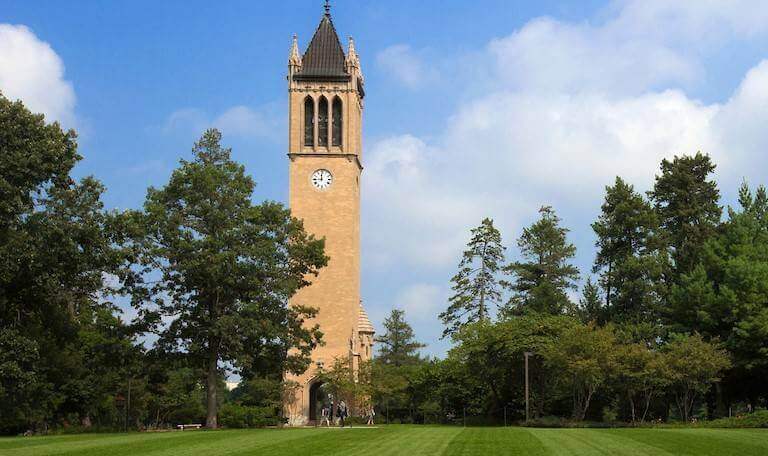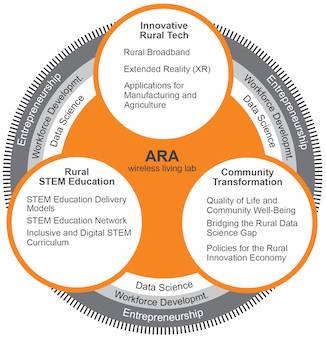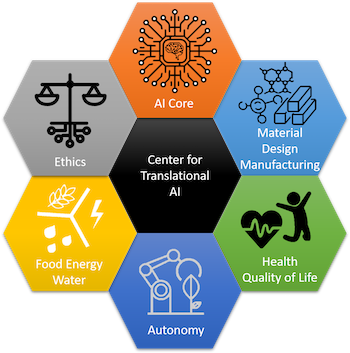Two projects awarded 2021 PIRI grants
Posted Jun 4, 2021

Posted Jun 4, 2021

Two multidisciplinary research initiatives – one to establish Iowa State as a national leader in promoting and enabling a rural innovation economy and the other on positioning the university as a leading research institution in Translational AI (artificial intelligence) – have been awarded 2021 Presidential Interdisciplinary Research Initiative (PIRI) grants.
The two were selected from a strong field of 13 complete proposals submitted to the Office of the Vice President for Research (OVPR). The PIRI program was established in 2012, and is sponsored by the Office of the President. Large interdisciplinary research teams can receive funds that range from $125,000 to $250,000 annually for up to three years to support efforts that address issues that have broad economic and societal impact, and are strong candidates to receive additional support from more than one outside agency. Each of the new PIRI recipient teams will receive $150,000 annually for up to three years.
Here are brief overviews of each winning project and listings of the key investigators contributing to each team.
 The primary objective of TechTHRIVE is to establish Iowa State as a national leader in promoting and enabling a rural innovation economy through research on cutting-edge technologies for rural applications and STEM educational initiatives designed to meet the needs of rural learners. The dual focus on technology and education will catalyze transformational change in rural Iowa by attracting new industries and highly skilled, high-paying jobs that will encourage more young people and professionals to remain in, or return to, rural areas. Key components of the TechTHRIVE vision include supporting job creation in technology-driven sectors, fostering new business creation and entrepreneurship, and enriching small-town quality of life so that these communities are welcoming places to live and raise families. New workforce development models will also be designed to engage an untapped population of potential STEM workers and entrepreneurs already residing in these communities. Such efforts, which will include collaborations with historically underrepresented communities, will help to address growing income inequality and educational disparities in rural Iowa. The long-term goal is an ISU-led network of such hubs across the U.S. based on TechTHRIVE’s success.
The primary objective of TechTHRIVE is to establish Iowa State as a national leader in promoting and enabling a rural innovation economy through research on cutting-edge technologies for rural applications and STEM educational initiatives designed to meet the needs of rural learners. The dual focus on technology and education will catalyze transformational change in rural Iowa by attracting new industries and highly skilled, high-paying jobs that will encourage more young people and professionals to remain in, or return to, rural areas. Key components of the TechTHRIVE vision include supporting job creation in technology-driven sectors, fostering new business creation and entrepreneurship, and enriching small-town quality of life so that these communities are welcoming places to live and raise families. New workforce development models will also be designed to engage an untapped population of potential STEM workers and entrepreneurs already residing in these communities. Such efforts, which will include collaborations with historically underrepresented communities, will help to address growing income inequality and educational disparities in rural Iowa. The long-term goal is an ISU-led network of such hubs across the U.S. based on TechTHRIVE’s success.
Investigators
 The Center will position Iowa State as a leading research university in the area of Translational AI by establishing a university-level research center. Over the past few years, the ISU research community has made significant intellectual contributions at the intersection of AI and various application sectors such as agriculture, manufacturing, healthcare and transportation. However, these efforts have been mostly siloed, involved small teams pursuing small to midsize investments, and lacking a bottom-up institution-wide cohesion. With the support of the OVPR, the team envisions breaking down disciplinary silos and bringing together core AI researchers at Iowa State with domain experts interested in applying AI in domains that are traditional and emerging strengths at the university. The Center will nurture Translational AI research at Iowa State and make ISU competitive for large-scale funding opportunities in several AI-enabled disciplines.
The Center will position Iowa State as a leading research university in the area of Translational AI by establishing a university-level research center. Over the past few years, the ISU research community has made significant intellectual contributions at the intersection of AI and various application sectors such as agriculture, manufacturing, healthcare and transportation. However, these efforts have been mostly siloed, involved small teams pursuing small to midsize investments, and lacking a bottom-up institution-wide cohesion. With the support of the OVPR, the team envisions breaking down disciplinary silos and bringing together core AI researchers at Iowa State with domain experts interested in applying AI in domains that are traditional and emerging strengths at the university. The Center will nurture Translational AI research at Iowa State and make ISU competitive for large-scale funding opportunities in several AI-enabled disciplines.
Investigators (primary)
In total, this effort brings together 40 faculty members representing all seven of the university’s colleges.
“These two projects – led, respectively, by Dr. Zhang and Dr. Zarecor, and Dr. Sarkar – are stellar examples of the multiplicative power of interdisciplinary research,” said Peter Dorhout, Iowa State vice president for research. “Both, in their own way, are focused on breaking down barriers and bringing together a multitude of disciplines to identify substantive solutions that have the potential to deliver real, lasting impact to society and our state and national economies. Each research effort truly embodies the spirit of the PIRI program.”
Early in the fall semester, the OVPR will publish a follow-up article that takes a more in-depth look at the work of each of the new PIRI-winning projects.